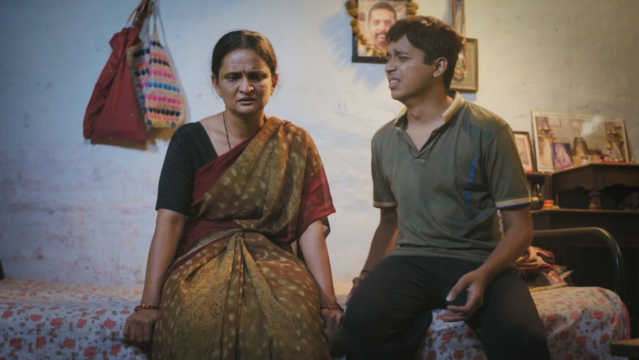
Blessy Chettiar
Mumbai, 18 May 2018 6:00 IST
Updated: 19 May 2018 13:18 IST
Monkey Baat has a child artiste at its centre but also the usual tropes used in a children’s film — a thin conflict (with great potential that remains untapped), too many characters, a manifestation of god and a generous sprinkling of values and morals.

Producers see the summer vacation as a good time to let kiddie flicks loose on unsuspecting parents who are looking for ways to keep their children occupied and entertained.
On one hand, few children’s films (with a child at its centre) can be watched and enjoyed by the younger audiences. On the other extreme is the tendency of filmmakers to dumb down content for children, considering them incapable of understanding the layers and complexities of a story.
Then there is the problem of preaching morals in the garb of entertainment. This is not a bad thing if a valuable message unfolds subtly and smartly. In all this, the promotion of stereotypes is just not acceptable.
Monkey Baat has a child artiste at its centre but also the usual tropes used in a children’s film — a thin conflict (with great potential that remains untapped), too many characters, a manifestation of god and a generous sprinkling of values and morals.
Vayu (Vedant Apte) is a bright student. He lives with his parents Shrikant (Pushkar Shrotri) and Anjali (Bhargavi Chirmule) in Kolhapur. Vayu’s life involves playing in the great outdoors and striking lasting and meaningful friendships with the simple village children. Just like his name, meaning wind, he is a free spirit.

One fine day, Shrikant decides to move with his family to Mumbai for better job and education opportunities. Vayu finds it extremely difficult to adapt to his new surroundings and make friends. The city children tease him for his Kolhapuri accent and make it tough for him as they lie and get him into trouble.
Their lies make Vayu respond in negative ways, as he resorts to acts that range from harmless to life-threatening. He believes his parents will take him back to the village if he misbehaves enough. A reference in the title to his monkey mind cannot be missed.
While Vayu’s actions are unjustified, the film takes a preachy turn as the god Krishna (played by Avdhoot Gupte) keeps appearing to him, warning against all his bad deeds. Krishna warns Vayu that he will turn into a monkey in line with the mythological tale of Shishupal.
In the Mahabharata, Krishna vowed not to harm Shishupal even if he committed 100 sins. However, for his 101st sin, Krishna kills him by striking him with his Sudarshan chakra. In Monkey Baat, Vayu is told that once he crosses the 100 mark for his bad deeds, he would turn into a monkey.
Vedant Apte as Vayu finds himself in a physically challenging role. He does well with his expressions and overall act, but is let down by the hollowness of the script. Story and screenplay writer and director Viju Mane’s intentions are noble, but he uses loud music and unnecessary camera gimmicks to fill in the gaping holes. Plain nobility of intentions just doesn’t cut it these days.
Cameraman Krishna Soren captures the chase sequences well, with Dr Salil Kulkarni’s music ably supporting him. However, both of these are abused to create a fake sense of urgency, cheating the audience of what could have been a simple lesson in the difference between good and bad deeds. Not to mention Avdhoot Gupte’s OTT Krishna who becomes more cringe-worthy with every scene.

Viju Mane attempts to show a mirror to society where parents have little time to spend with children and kids in turn are left in the company of people who may be a bad influence on them. However, he largely fails to make it fun, thanks to the gimmicky stock characters and an uninspiring screenplay.
The portrayal of the watchman character Bahadur (Sameer Khandekar) reinforces the stereotype of Nepalis as security personnel and not in a way that it would be okay for children to know them. The forest officer played by Mangesh Desai also shows stereotypical traits of South Indians.
Mane denigrates city life at every opportunity. The songs ‘Shyaa Kuthe Yeun Padlo Yaar’ and ‘Hahakar’ written by Sandeep Khare talk of the empty city life and Vayu’s destructive turn, respectively. They are given a rock treatment, but the lyrics try too hard to impress. The easy route taken at the climax is also disconcerting.
Monkey Baat has a valuable message for kids. However, dumbing it down makes it largely uninteresting. It is a good concept, let down by simplistic execution. Exploring the behaviour of children in response to changes in their environment is difficult but holds great promise for a big screen show. If you must watch something on the big screen this week, let it be Redu.
You might also like

Review Marathi
Samaira review: This well-intentioned travel drama suffers from a dull script
Actor Rishi Deshpande's directorial debut doesn't rise as much as its performances. ...

Review Marathi
Goshta Arjunchi review: Triggering conversations about mental health
Anupam Barve’s short film urges people to talk to their families about what they are going...

Review Marathi
Ekda Kaay Zala review: Sumeet Raghvan impresses in a film that does not use its full potential
Directed by Dr Saleel Kulkarni, the film has a fine act by child artiste Arjun Purnapatre....

